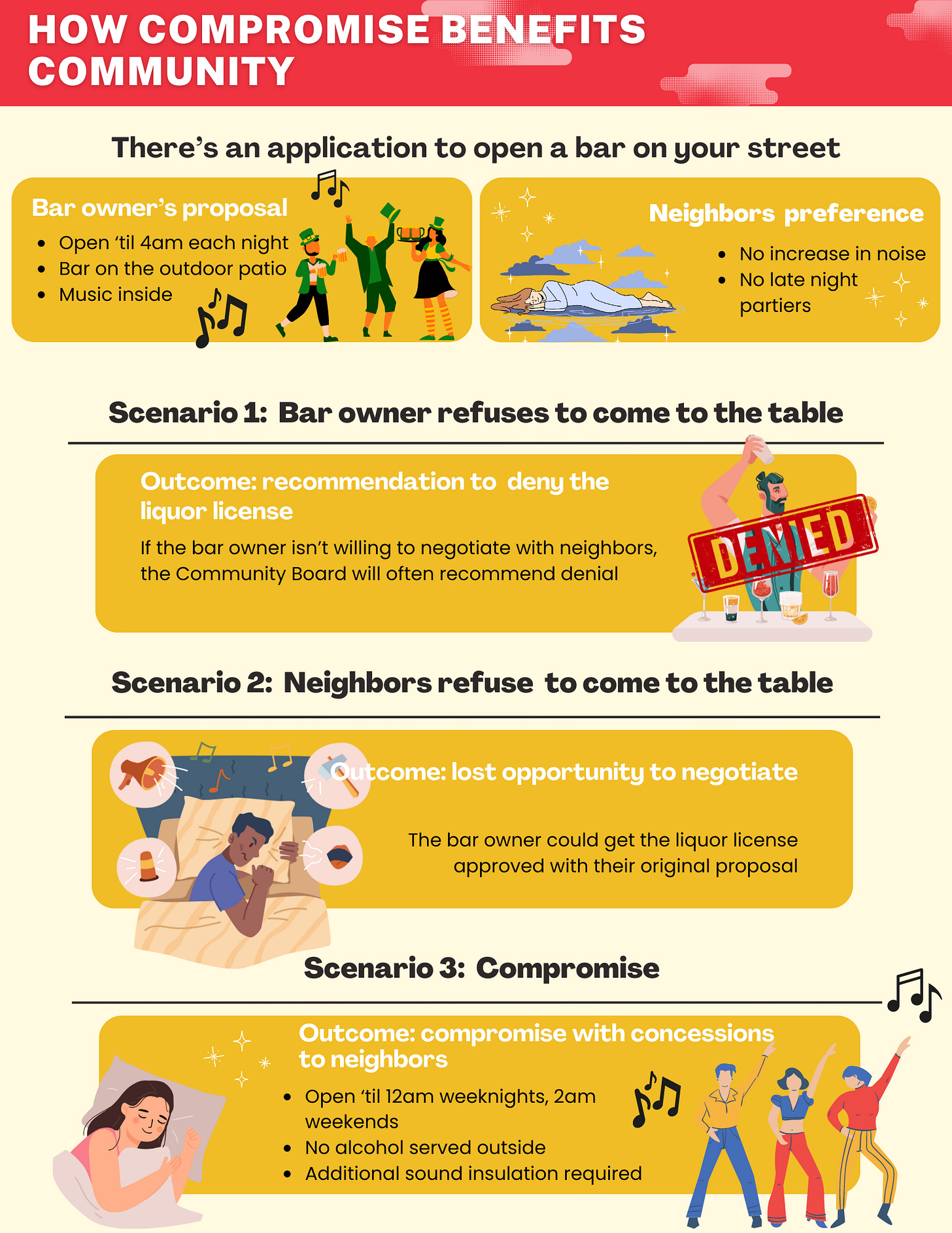NYC Politics 101: We voted for the casino, but no one wants it in their backyard
So how do we offset the negative side effects as much as possible?
Hot takes are my own and not the views of Manhattan Community Board 5
NYC is getting a casino. After decades of gambling industry lobbying.
The question is not whether, but when and where, NYC will have a casino. In 2013, Gov. Andrew M. Cuomo rallied business groups and labor unions together to support passage of a constitutional amendment to allow seven private casinos in New York State. The stated benefit? Tax revenue and casino jobs upstate. The official voter pamphlet description of the referendum was so one-sided and overly glowing, advocates sued the administration for misleading voters. The New York Times called the referendum “a textbook case of how well-financed interests can push Albany to embrace an industry”. Voters fell for it, and approved the constitutional amendment with 57% of the vote.
There are nine casino proposals on the table, from Coney Island to Hudson Yards. In order to pass, the winning casino bid will need the support of the community.
But no one wants a casino in their backyard.
I serve on Manhattan Community Board 5 (CB5), so a few of the proposals fall within my district: the one in Times Square and the one on top of Saks Fifth Avenue. Like 19 other community boards, CB5 is on the record opposing casino development in our district.
If NYC is getting a casino, let’s offset the negative side effects as much as possible.
If there’s one thing I’ve learned from my tenure on CB5, it’s that collaboration and compromise are critical for coexisting in such a dense area. I serve on our liquor license committee, so many of my projects have included facilitating negotiations between residents and liquor license applicants. When residents aren’t willing to compromise, they lose the power to extract concessions from applicants, like closing the bar at 10pm on weekdays or forcing the club to install additional noise buffering material. When applicants aren’t willing to compromise, the community board may recommend the state liquor authority deny their license entirely. When both sides are willing to compromise, both sides win. Residents get a bit more peace and quiet and operators get to make a living too.
There are 3 main community concerns about casinos in NYC:
Crime
Problem Gambling
Traffic
Since problem gambling is the biggest local issue associated with casinos, communities should demand additional protections from operators.
What about crime? On crime, the research does not show a clear trend. Isolating the effect of casinos on crime is really challenging, and also most of the literature uses data from smaller cities from the late 1970s to early 2000s. We only have two years of data for the casinos that just opened upstate, but crime has not markedly increased there.
Do casinos increase traffic? It depends. What’s the alternative? If the space isn’t a casino, what will it be? If it’s a vacant lot, then yes the casino would have more traffic. But NYC real estate is too expensive to leave vacant. The Hudson Yards plan is to add public open space and three skyscrapers that would include the casino, housing, hotel rooms, office space, and a public school on top of what is now railyards. My take? It’s a wash. NYC developers that don’t win the casino permit will still build something valuable in that space. That valuable thing will increase traffic.
Do casinos increase problem gambling? Yes: the more convenient you make gambling, the easier it is for people to become addicted. Researchers at the University at Buffalo's Research Institute on Addictions found that casinos have a significant effect on problem gambling (90% increase) on residents within 10 miles. And those living in disadvantaged neighborhoods reported much higher rates of problem gambling (10%) than those not living in disadvantaged neighborhoods (1%).
Problem gambling, like any addiction, impacts more than just the individual: their family and friends are affected, and they impose costs to society (e.g. medical, police, legal).
Even worse, the casino business model relies on problem gamblers. Estimates also range on the proportion of casino revenues that come from problem gamblers, but most estimates fall in the 15 - 50% range. That’s a significant proportion of a business’s revenue. The casino business model relies on extracting money from people who are addicted to gambling. Many of whom come from disadvantaged neighborhoods.
Part 3 next week: communities should demand additional concessions from casinos to decrease problem gambling.





Compromise benefits the community when there is a benefit to the community to be gained. Hugely funded lobbyists for ruthless industries learned long ago how to win votes with false assurances and promises which will be quickly broken. Our community should stand firm against an industry which preys upon the poor, weak and broken; benefiting no one but the hugely wealthy who withhold the tax money which would, in fact, benefit the communities these industries and lobbyists ruthlessly exploit.